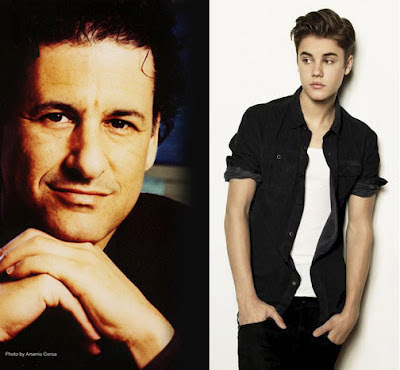Neuroscience

Well not really, but it's not too much of a stretch to combine two recent pop neuro threads on the evils of dopamine into one dopameme. In the first, heretofore reputable neuroscientist Dr. Daniel Levitin of McGill University is quoted in the Daily Mail:
In the second part of our dopameme, a recent post by Dr. Victoria L. Dunckley in Psychology Today explained how computers and video games cause psychosis:
The mechanism for this anecdotal deterioration? Dopamine!
Good god. Dirk Hanson has started a comment thread on this irresponsible claim, Screen Time is Melting Our Children’s Brains—Or Something, at Addiction Inbox. I have a[pending] comment there, along with Neuroskeptic and Professor Keith Laws [edited to add].
Let's Go Back Inside the Brains of Bieber Fans
Did Levitin actually say that Bieber fever is "hardwired"? Probably not. [UPDATE (July 9, 2012) - In a comment, Dr. Levitin has confirmed that he was misquoted by the MAIL. What a surprise!] The Daily Mail might be considered a little less reputable than the Wall Street Journal:
But more importantly, I've received an anonymous tip that another leading neuroscientist bears an uncanny resemblance to Justin Bieber.

Disclaimer: Neither Levitin nor Dunckley actually said that Bieber causes psychosis.
- Unusual Experiences In Everyday Life
By Vaughan Bell, of Mind Hacks. To generalise, most psychiatrists see themselves as applied neuroscientists, while most clinical psychologists explain psychopathology in terms of mental processes and social relationships, and make little reference to...
- Abc News Says: 'trust Drug' Oxytocin Unbelievable For Now
BUT 'Adventure Center' Explains Why Brain Craves New Sensations Newness Factor Weighs in on Brain By ALLYSON T. COLLINS ABC News Medical UnitJune 25, 2008—...Humans may be wired to seek out new experiences, according to a study published Wednesday...
- Music Of The Hemispheres
risser_pic_31dec06_neuropsychology_tuscany Originally uploaded by rissera. Interesting piece in today's New York Times about music and the brain and work by Daniel Levitin [link]. Curious neuro readers are directed to some classical papers...
- Parkinson Disease
From an NIH press release on 04 July 2006: Dopamine Drug Leads to New Neurons and Recovery of Function in Rat Model of Parkinson's Disease In preliminary results, researchers have shown that a drug which mimics the effects of...
- Uconn Cog Sci Colloquia -- Spring 2007
Here are the upcoming Cognitive Science Colloquia for spring 2007: February 9th: Richard Ashley, Northwestern University, on musical cognition. March 30th: Randy Beer, Indiana University, on coordinated behavior. April 13th: Mark Changizi, Caltech /...
Neuroscience
Justin Bieber Causes Psychosis, says a leading neuroscientist

Well not really, but it's not too much of a stretch to combine two recent pop neuro threads on the evils of dopamine into one dopameme. In the first, heretofore reputable neuroscientist Dr. Daniel Levitin of McGill University is quoted in the Daily Mail:
'Beliebers' suffer a real fever: How fans of the pop sensation have brains hard wired to be obsessed with him
By Mail On Sunday Reporter
PUBLISHED: 18:29 EST, 30 June 2012 | UPDATED: 07:20 EST, 1 July 2012
Justin Bieber fans can’t help their obsession – it’s hardwired into their brain, says a leading neuroscientist.According to Professor Daniel Levitin ‘Bieber Fever’ (symptoms include screaming, fainting and constantly tracking the teen idol on Twitter) is a real physical compulsion.When ‘Beliebers’ – as Bieber’s 44 million fans are known – listen repeatedly to his music, a chemical responsible for feelings of pleasure is released in their brains.‘It triggers a rush of dopamine, the neurotransmitter stimulated by lots of other pleasurable activities such as orgasms or eating chocolate,’ Professor Levitin said last week.The neuroscientist, of McGill University, Montreal, added: ‘Dopamine is released at much lower levels by music than, say, the use of drugs and the result usually is an obsession, in which you require more and more Justin Bieber.’
In the second part of our dopameme, a recent post by Dr. Victoria L. Dunckley in Psychology Today explained how computers and video games cause psychosis:
Computer, Video Games & Psychosis: Cause for Concern. . .In my practice in the past six months, no less than five youths have reported psychotic symptoms that were attributed to, or exacerbated by, electronic screen devices.
The mechanism for this anecdotal deterioration? Dopamine!
Electronic screens, particularly interactive ones (as opposed to passive ones, like television), increase dopamine in the reward center of the brain. This effect has been demonstrated by brain scan (Koepp, 1998: http://www.nrc-iol.org/cores/mialab/fijc/Files/2002/120402_Koepp_Nature_1998.pdf ) Dopamine is known as the brain's "feel good" chemical, but is also related to stress, addiction, anxiety, mood, and attention. Dopamine in excess can lead to psychotic symptoms--voices, delusions, paranoia, or confusion.
Good god. Dirk Hanson has started a comment thread on this irresponsible claim, Screen Time is Melting Our Children’s Brains—Or Something, at Addiction Inbox. I have a
Let's Go Back Inside the Brains of Bieber Fans
Did Levitin actually say that Bieber fever is "hardwired"? Probably not. [UPDATE (July 9, 2012) - In a comment, Dr. Levitin has confirmed that he was misquoted by the MAIL. What a surprise!] The Daily Mail might be considered a little less reputable than the Wall Street Journal:
What's Behind Bieber Fever? Neuroscience Offers Explanation; a 'Safe' InfatuationBy MELINDA BECK. . .Hearing familiar, favorite music stimulates the release of dopamine, the neurotransmitter involved in pleasure and addiction, providing the same rush as eating chocolate or that winning does for a compulsive gambler, says neuroscientist Daniel Levitin, who was able to observe the process using fMRI scans in his lab at McGill University in Montreal.Dr. Levitin's research also showed that musical tastes formed in the teen years become part of the brain's internal wiring, as that is the time when some neural pathways are solidifying and others are being pruned away. That's why the music adults tend to be nostalgic for is the music from their teenage years.
But more importantly, I've received an anonymous tip that another leading neuroscientist bears an uncanny resemblance to Justin Bieber.

Disclaimer: Neither Levitin nor Dunckley actually said that Bieber causes psychosis.
- Unusual Experiences In Everyday Life
By Vaughan Bell, of Mind Hacks. To generalise, most psychiatrists see themselves as applied neuroscientists, while most clinical psychologists explain psychopathology in terms of mental processes and social relationships, and make little reference to...
- Abc News Says: 'trust Drug' Oxytocin Unbelievable For Now
BUT 'Adventure Center' Explains Why Brain Craves New Sensations Newness Factor Weighs in on Brain By ALLYSON T. COLLINS ABC News Medical UnitJune 25, 2008—...Humans may be wired to seek out new experiences, according to a study published Wednesday...
- Music Of The Hemispheres
risser_pic_31dec06_neuropsychology_tuscany Originally uploaded by rissera. Interesting piece in today's New York Times about music and the brain and work by Daniel Levitin [link]. Curious neuro readers are directed to some classical papers...
- Parkinson Disease
From an NIH press release on 04 July 2006: Dopamine Drug Leads to New Neurons and Recovery of Function in Rat Model of Parkinson's Disease In preliminary results, researchers have shown that a drug which mimics the effects of...
- Uconn Cog Sci Colloquia -- Spring 2007
Here are the upcoming Cognitive Science Colloquia for spring 2007: February 9th: Richard Ashley, Northwestern University, on musical cognition. March 30th: Randy Beer, Indiana University, on coordinated behavior. April 13th: Mark Changizi, Caltech /...
